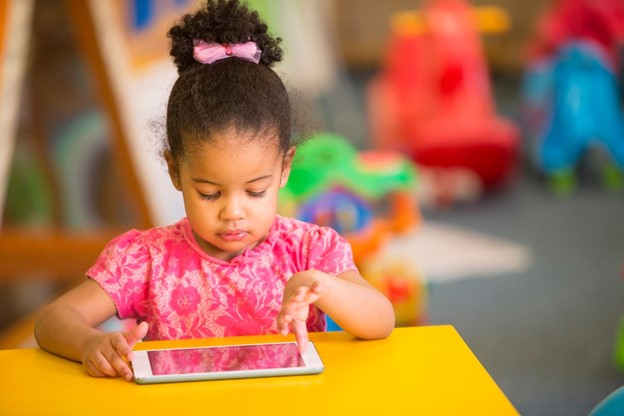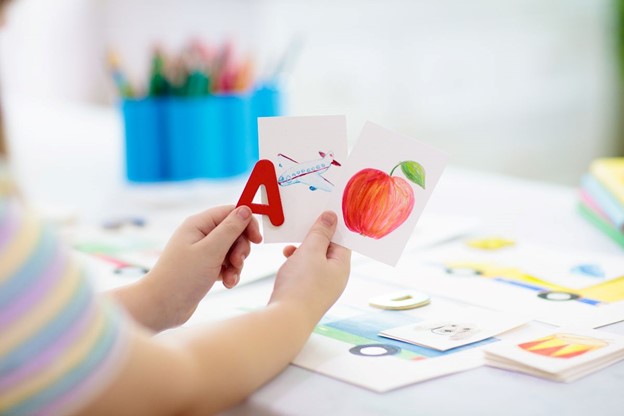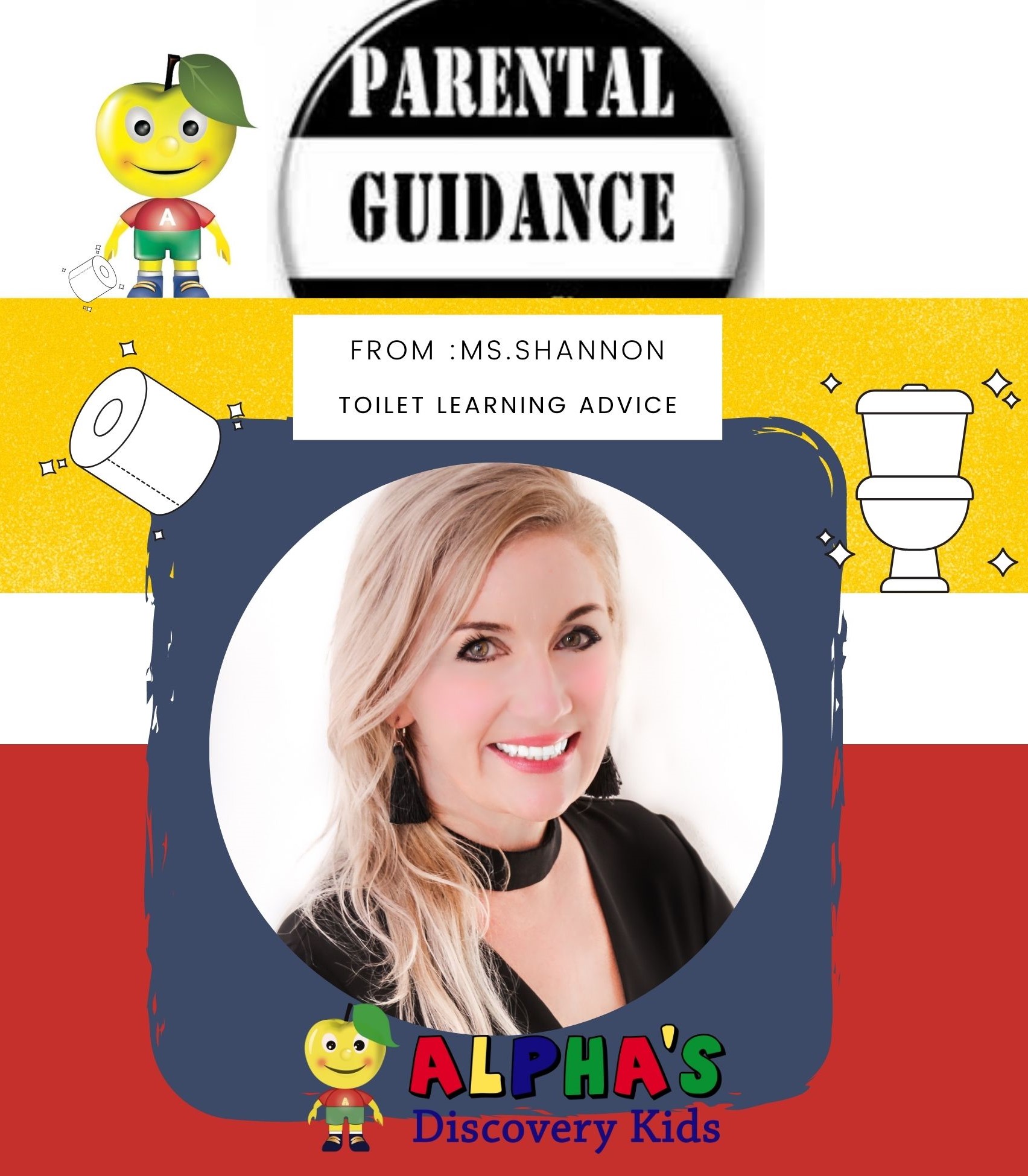Unlocking the Wonders of STEAM: Embracing the Power of Math
Unlocking the Wonders of STEAM: Embracing the Power of Math
by Susie Beghin, RECE, Founder of Alpha’s Discovery Kids
At Alpha’s Discovery Kids, we are passionate about providing a nurturing and enriching learning environment where children can thrive.
As advocates of STEAM education, we wholeheartedly embrace the power of Science, Technology, Engineering, Arts, and Math in shaping well-rounded individuals. Our commitment to excellence lies in infusing STEAM concepts throughout our curriculum, empowering young minds with essential skills and fostering a love for learning that lasts a lifetime.
And that’s why we created our unique and comprehensive approach to education, centered around the “The Four Pillars of Learning.” These pillars serve as the foundation of our curriculum, ensuring that every child’s physical, cognitive, social, emotional, and spiritual well-being is nurtured and supported.
The 4 Pillars of Learning consist of Language & Literacy, STEAM (Science, Technology, Engineering, Arts, and Math), Physical Activity & Nutrition, and Mindful Awareness. Each pillar is carefully designed to complement and reinforce one another, creating a holistic learning experience that fosters creativity, critical thinking, and a growth mindset in our young learners.
By embracing these four pillars, we aim to provide a well-rounded education that prepares children not only for academic success but also for personal growth and success in all aspects.
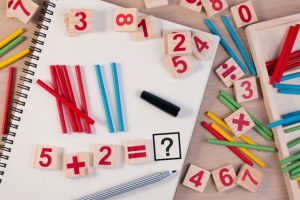
When it comes to Math, it is more than just numbers and equations. Math is a fundamental tool for understanding the world around us. From counting and measuring to problem-solving and critical thinking, math plays an integral role in shaping a child’s cognitive abilities and analytical skills.
Math is an important part of a child’s development from ages 1 to 5 years. During this time, children explore patterns, shapes, sizes, and counting and encounter math concepts in their everyday activities, from counting cars on the road to the number of plates on the table.
However, math can be daunting for both kids and parents. That’s why we believe in teaching math in a visual and hands-on way. For example, when we say 1 plus 1 equals 2, it’s easier to understand when we can see and touch objects to represent those numbers. We want children to experience math in a concrete way, so they truly grasp its concepts.
Math is all around us, and it’s essential to make it approachable and enjoyable for everyone. Some important math skills that we focus on here at Alpha’s Discover Kids include:
Numeracy skills – Skills like counting are among the first things children learn. Many children learn to count from 1 to 10 by age three. We encourage counting everyday objects in a hands-on way to help them grasp the concept. Once children start to understand the concept of counting, you can introduce written numbers so they learn to associate the written form with the concept.
Problem-solving – Another essential math skill is problem-solving, although this can be a tricky concept for many kids. We support children in their problem-solving process without doing it for them. By using number concepts and skills, we help them develop confidence in their own ability to think things through.
Measurement – Measurement is an exciting aspect of math. Children can explore time, weight, distance, length, height, and width in various activities.
Classification – Classification is a fun game where children sort and classify objects based on different characteristics like shape, size, or colour.
To incorporate math into everyday activities, we sort various items into baskets, provide objects to count while filling and emptying containers, and make number figures from play dough. These activities make math a part of their daily fun, helping children build essential math skills while having a great time.
We aim to instill a love for Math by making it accessible, enjoyable, and applicable to the real world. We foster a growth mindset, where children embrace challenges, ask questions, and take risks in their mathematical explorations.
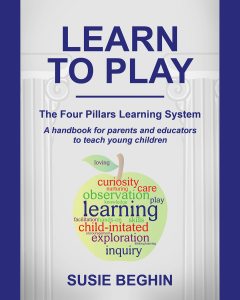
For more information about how to use the Four Pillars of Learning system, check out Susie’s book, Learn To Play: The Four Pillars Learning System on Amazon.
For more information about Alpha’s Discovery Kids, or to book a tour, please contact us at https://www.alphasdiscoveryclub.com/contact/ or call us at 905-823-8257.
Unlocking Creativity And Imagination Using Loose Parts
Unlocking Creativity And Imagination Using Loose Parts
by Susie Beghin, RECE, Founder of Alpha’s Discovery Kids
At Alpha’s Discovery Kids, we believe in fostering a creative and imaginative environment for children, where learning extends beyond traditional toys and structured activities. That’s why we are reintroducing an exciting element to our curriculum—”loose parts”.
“Loose parts” are open-ended materials, which include items such as boxes, tubes, string, rocks, corks, paper clips, marbles and jar lids (just to name a few), have the potential to transform the way children engage with their surroundings, enhancing their critical thinking, problem-solving, and imaginative skills.
We have been inspired to reintroduce loose parts back into our curriculum after conducting some research that emphasized their profound impact on children’s learning and development.
We are in the process of building our loose parts repository, which involves collecting a diverse range of materials from various sources, including a recycling center in Mississauga. We are also encouraging parents to contribute loose parts that they have around the home, allowing us to create a wide array of materials that align with our curriculum and projects.
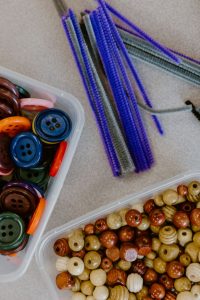
How we use loose parts in the classroom
At Alpha’s Discovery Kids, our Four Pillars of Learning—Language/Literacy, STEAM (Science, Technology, Engineering, Art, Math), physical activity/nutrition, and mindful awareness—form the foundation of our curriculum.
And incorporating loose parts into our curriculum opens up a world of possibilities for children’s learning experiences. We strategically select loose parts based on their connection to our curriculum pillars. For example, natural loose parts align with our science activities, recycled materials find their place in art projects, and boxes become a part of our engineering explorations.
The introduction of loose parts sparks a sense of wonder and discovery in children. Unlike commercial toys with predefined functions, loose parts invite children to use their creativity and imagination. A simple box can instantly transform into a spaceship, a house, or a magical kingdom. This open-ended nature allows children to explore, experiment, and engage in critical thinking as they repurpose and reimagine these materials.
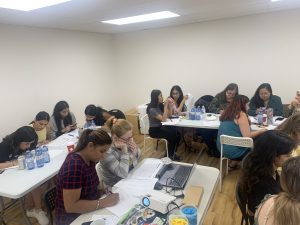
The benefits of using loose parts as part of our 4 Pillars Curriculum
All our educators recently attended a company training day focusing on “loose parts”. We have already begun incorporating loose parts into our activities, and the response from children has been incredible. For instance, when we introduced a box into a sensory bin, children were immediately drawn to it. They started exploring its potential, filling it with objects and experimenting with ways to interact with it. The teachers even created a tunnel with a roof using boxes, and the children had so much fun crawling and walking through it. These experiences exemplify how loose parts can transform the classroom environment and ignite children’s curiosity and engagement.
The beauty of loose parts lies in their ability to adapt and evolve. They provide endless opportunities for children to collaborate, problem-solve, and co-create with their peers and teachers.
By incorporating loose parts into our curriculum, we encourage children to think outside the box (literally!) and develop vital skills that go beyond academic knowledge. Loose parts stimulate their imagination, boost their confidence, and nurture their holistic development.
As we continue to expand our loose parts collection and incorporate them into our activities, we are excited to witness the transformative impact they will have on our children’s learning journeys. We invite parents to join us on this exciting adventure, contributing to our loose parts repository and embracing the endless possibilities that these materials offer.
At Alpha’s Discovery Kids, we are committed to providing an environment where children can explore, create, and grow, nurturing their potential to become anything they desire. So together, let’s celebrate the power of loose parts and their ability to unlock creativity, imagination, and critical thinking skills in young minds.
For more information on our 4 Pillars of Learning, or to book a tour, please contact us at https://www.alphasdiscoveryclub.com/contact/ or call us at 905-823-8257.
Young Children and Technology
Young Children and Technology
by Susie Beghin, RECE, Founder of Alpha’s Discovery Kids
At Alpha’s Discovery Kids, we recognize the world is an ever-changing place. And with technology continuing to evolve in leaps and bounds, our young children are even more technologically advanced than we could have ever imagined.
This is part of the reason why I wrote my book, ‘Learn To Play’. I wanted to share my knowledge and learnings that I have personally acquired during my time as an ECE educator and a mother. It is important that I share what I know about how children learn with other parents.
At Alpha’s Discovery Kids, we teach kids using our 4 Pillars of Learning curriculum in a way that is playful and fun. Our 4 Pillars of Learning include: Language & Literacy, STEAM (Science, Technology, Engineering, Art and Math), Physical Activity & Nutrition and Mindful Awareness. When I was developing the 4 Pillars, I wanted to ensure I created a program that meets a child’s needs from physical, cognitive, social, emotional and spiritual well-being.
In this article, I want to focus on technology and how it can play a valuable role in young children’s development.
Technology (the second part of STEAM)
Technology is at the core of mostly everything we do nowadays. When we hear the word “technology,” the first thing that often comes to mind is screen time. However, at our daycare, technology is so much more than that. We embrace technology as a tool that enhances learning, fosters parent involvement, and creates exciting opportunities for children to explore the world around them.
Technology as a Resource Tool:
In our classrooms, we utilize iPads as resource tools, opening up a world of knowledge to young minds. For example, when learning about the solar system, we can access captivating videos that visually depict the planets, enabling us to teach complex concepts in an engaging and interactive manner. Technology becomes a catalyst for exploration and discovery, enhancing the learning experience for our children.
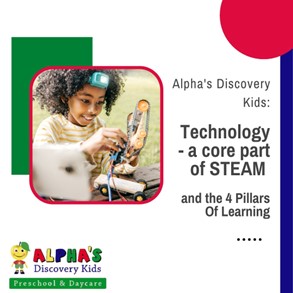
Connecting with Experts and Resources:
Through technology, we have access to a wealth of experts and resources. Whether it’s inviting guest speakers via video conferences or conducting virtual field trips, we can bring diverse perspectives and experiences directly into our classrooms. Technology enables us to expand our horizons and expose children to a vast array of knowledge and expertise.
Communication and Parent Involvement:
One of the most remarkable benefits of technology in our daycare is the ability to record and share children’s daily activities. Through our app, HiMama, we capture videos, photos, and data, documenting each child’s progress, meals, sleep patterns, bathroom breaks, and educational milestones. This instant and real-time information empowers parents to stay involved in their child’s daily life, creating a strong connection between the daycare and home.
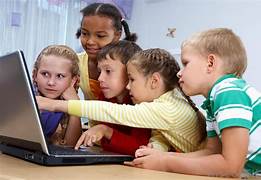 Research and Exploration:
Research and Exploration:
Technology serves as a gateway to endless knowledge. When children have questions or curiosities, we can use technology to conduct research together. For instance, if we want to delve into the fascinating world of polar bears, we can easily access factual information, statistics, and even watch videos about their habitats and behaviors. This interactive approach instills a love for learning and nurtures children’s natural curiosity.
Creativity and Play:
Technology also has a role in fostering creativity and imaginative play. We incorporate music into our classrooms, utilizing technology to play songs and create a lively atmosphere. Additionally, we encourage children to explore their creativity by using technology to record and produce their own little videos, allowing them to express themselves and share their experiences with others.
At Alpha’s Discovery Kids, technology is not a mindless tool for entertainment; it is a purposeful and valuable asset that enriches the learning environment and strengthens the bond between parents, children, and educators.
We harness the power of technology to empower children, promote active learning, and create a sense of involvement and collaboration among parents. Technology opens doors to a world of knowledge, ensuring that our children are equipped with the skills and curiosity needed to thrive in the digital age.
By combining multiple aspects of STEAM every single day, our educators at Alpha’s Discovery Kids are able to teach multiple concepts in one lesson. And STEAM is a pivotal part of this learning.
For more information on our 4 Pillars of Learning, or to book a tour, please contact us at https://www.alphasdiscoveryclub.com/contact/ or call us at 905-823-8257.
Language and Literacy in the Early Years – Four Pillars of Learning
Language and Literacy in the Early Years – Four Pillars Of Learning – Pillar #1
by Susie Beghin, RECE, Founder of Alpha’s Discovery Kids
When I sat down to write my book, Learn To Play, my goal was to share the knowledge and learnings that I have personally had during my time as an ECE educator and a mom.
My mission has always been to give children the best start in life, and at the core of this is showing children how to develop the critical skills they need to succeed in life.
Parents and Caregivers are the most important educators for our children, and our goal at Alpha’s Discovery Kids is to help enhance what parents are already doing at home by guiding children through each of our Four Pillars of Learning, allowing them to learn in a meaningful way.
When I developed the Four Pillars of Learning system, my focus was on developing a program that meets a child’s needs from physical, cognitive, social, emotional and spiritual well-being.
The Four Pillars of Learning consist of Language & Literacy, STEAM (Science, Technology, Engineering, Art and Math), Physical Activity & Nutrition and Mindful Awareness. These pillars are taught in every classroom in each of our 3 locations.
LANGUAGE & LITERACY – THE FOUNDATION OF ALL PILLARS
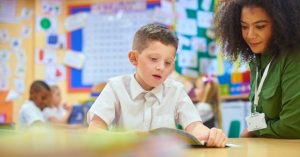
Just like the foundation of a house helps support the rest, Language & Literacy is the basis of all the other pillars. However, children cannot learn the other pillars without first learning communication, both spoken and written.
In the early years, especially at the toddler stage, we heavily focus on spoken language, as this is the basis for the eventual skill of reading and writing.
We understand how imperative helping little brains to form is, and we recognize that each stage of growth and development requires focused and unique techniques geared towards helping kids learn and grow to the best of their ability.
When it comes to language and literacy, at Alpha’s Discovery Kids, we understand that the more we speak with children and engage them in real conversation, the better the child will develop these skills.
By teaching language and literacy in a fun and intuitive way that is easy to understand and remember, kids get to be kids while learning! And we don’t leave the learning to just one part of our day – literacy is weaved into every aspect of our children’s day. From listening to language songs during meal times to narrating play, we make learning language part of everything we do.
All of our early childhood educators narrate and label throughout the day. We even label objects with their word (e.g. the word table is taped onto a table) so that sight word memory can be infused throughout the classroom.
And by narrating and providing a play-by-play of what they are doing or using, our teachers can help the children increase their vocabulary in an easy and fun way.
THE JOLLY PHONICS PROGRAM
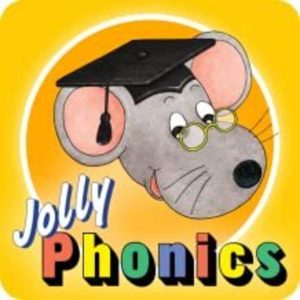
Here at Alpha’s Discovery Kids, we use the award-winning Jolly Phonics program. This program has been incredibly successful in helping kids learn to read and write in their early years. The program teaches letter sounds instead of the alphabet, starting with the most common letter sounds (S, A, T, etc.).
The goal is to start getting kids familiar with letters they will most often see and use for reading and writing. And by using a play-based program that uses music and song to teach letter sounds and letter names, kids can then piece together the various sounds to make words.
The amazing part of this program is that when kids learn the letter sounds, even if they don’t know the names of the letters yet, they can piece the sounds together to create words. And by blending the sounds, they can start to build and formulate words and, eventually sentences!
We also understand that learning styles will vary from child to child. Our literacy programs work for any type of learner. If your child is an auditory learner, they’ll learn from the catchy songs. If they are visual learners, they’ll learn from the movements and actions. And if they are Kinesthetic, they’ll learn by body movements that accompany the letters.
All of our knowledge and nurturing staff have one goal – to keep your child safe while fostering their creativity in a warm, caring environment while allowing them to reach their full potential.
By being patient and using specific strategies to help build their language skills, it’s amazing to see the progress a child can make.

Our New Mississauga Location is located at 2632 Liruma Road, Mississauga, ON L5K 1Z1. To book a tour or for more information, please contact us at https://www.alphasdiscoveryclub.com/contact/ or call us at 905-823-8257.
Toilet Training – How To Achieve Success
Toilet Training – How To Achieve Success
by Shannon Speers
From the moment of birth, humans strive toward independence. Young children especially feel the need to do things for themselves. Given guidance and opportunity, our children will achieve many things. At Alpha’s, we believe that by fostering independence, children can be active agents in their own development, including toilet training. Self-help, wellness routines such as washing their hands and face, dressing themselves and becoming independent in the washroom are all routines that can be mastered independently with increasing levels of self-reliance.
As a Centre Supervisor, one of the most popular questions parents ask involves toilet training. Our Toilet Training Reference Guide was designed to assist parents as they embark on one of the most challenging tasks that parents of young children will face. This can be challenging for many reasons. Acknowledging this whole heartedly will be the first step for any parent. We must first understand that we trained our children to wear diapers and now we must guide and un-train them from what they have always known. Before we can start, we need to recognize the difference between “toilet training” and “toilet learning”.
How does “Toilet Learning” differ from “toilet Training”?
- Toilet training is something that is adult directed. It may involve a time pressure for your child. Toilet training involves an attitude of having to do it now because the adult chooses so and creates a power struggle situation.
- Toilet learning is when the child is involved in their own learning. Toilet learning starts with readiness signs. Toileting is a skill that needs to be learned; it cannot be taught overnight. The key to toilet learning is teaching, not training.
One of the main differences between toilet learning and toilet training is the adult’s attitude which can have a big impact for the child. By allowing the child to learn on their own with a bit of support and help from the adult, you are providing an opportunity for empowerment.
Parents will often ask us if “we do potty training”. The answer is “No, we do toilet learning” and when I say “we”, I mean we do this together with the parents as a team and not strictly during school hours. This process is simply impossible without a joint effort between home and school. Often the issue lies with the commitment to the process. This can be avoided by developing an understanding of the importance of being as devoted to the process as you are to the end goal.
At Alpha’s, we work with families and help them to become prepared by offering guidance and support through active communication and set up plans together to achieve positive developmental achievements. Part of this is working together to determine developmentally appropriate time lines and monitor signs of readiness to begin the steps toward the children achieving autonomy of their bodies with respect to toileting.
If you have questions about this process, please reach out to us.



